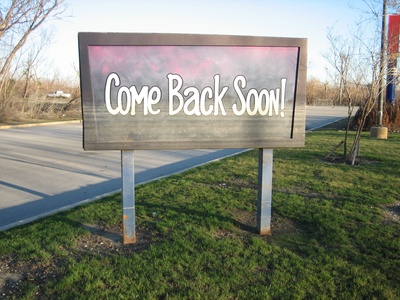I fear for too many LCMS congregations, there is not much of a reason to return. It is not simply because of facility or organist (or lack thereof) or pastor or people. It might be a combination of those things but it is more likely that they did not find anything there compelling enough to return. If you look hard enough at any congregation, you can find flaws. Pastors wear those flaws out for everyone to see -- Sunday after Sunday. But most folks who visit are not looking for a perfect congregation or a perfect church. They are simply looking for one worth returning to.
While there might be a number of components to that judgment that this congregation is worth a second look, chief among them is faithfulness. If the pastor is faithful and the people in the pews are faithful to God's Word and truth, there will be enough there to tell the visitor to come back again. But if the visitor finds that things are rather casual and not much care is given to the gravity of our sin and the magnitude of God's goodness, it will be easy to write off this congregation or that and not bother with a second look.
Along with faithfulness, is a commitment to do your best. For pastors this means turning your attention to the sermon before Saturday night and picking the hymns for more reason than you like them (or the people do). It means a practiced art of presiding in which the familiar texts of the Divine Service are treated as if they were new, carefully and deliberately spoken or sung. It means knowing what is going on in the Divine Service and planning your route through the liturgy carefully. It means that sometimes emergencies arise and you have to adjust but in general you plan and prepare for Sunday morning as the most important time of the week.
No parish has to do everything well but every parish has to do some things well. Faithful and engaging preaching, solid musical leadership from the organ, a clean facility, adequate parking, clear signage, and a good worship folder are at least the minimums the visitor expects and what we ought to offer to both visitor and member. The burden for this falls especially upon the pastor but not only so. Everyone who counts this parish as their church home has a duty and a responsibility to expect and aid everything to be done decently, in good order, our best for His glory.
Finally, is the issue of welcome. Cultivating a sense of welcome is vital for getting the visitor to return. This means noticing the visitor and expressing some interest in them and why they visit. My own parish is blessed to have 3-10 new faces walk through the door for their first visit every Sunday. Some of them are guests of members but the vast majority are real visitors -- people looking over the congregation in their search for a church home. While we like to think of ourselves as friendly, our welcome is an organized endeavor with several people deep at every entrance to notice, talk to the visitor, and connect them. This is especially true of those who practice close(d) communion -- it is foolish to say you practice close(d) communion and not be out there before the start of service to welcome the visitor and find out who they are and whether or not they desire to or should commune at this altar.
The way we advertise has changed. Gone are the days when people surveyed newspapers as their primary source of information. The Yellow Pages are not what they once were. Your presence on social media does not have to tantalize the curiosity of the visitor but it must be clear and current about worship times, pictures, maps, and what to expect if you do visit. This is the real value of social media for the Church -- not as a forum for commentary and comment but rather a means of getting your name and location and identity front and center for a people who connect primarily through media.
The time when folks might appreciate a home visit in response to their church visit has probably come and gone. They are probably not interested in a home baked goodie either. But they will welcome a contact -- email, snail mail, or phone. They would like to know somebody noticed them and, though it does not help to press them about their plans, it does help to ask them how best you might serve them in the aftermath of their visit. Instead of talking all about yourself or your congregation, ask about them and you may find out just enough information to help welcome them back again for what, we pray, will become a habit.

No comments:
Post a Comment